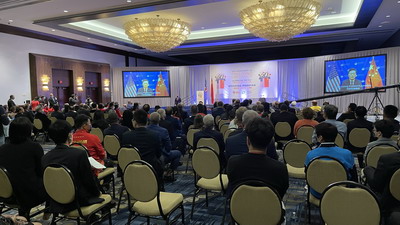 中文
中文

Dear Distinguished guests,
Ladies and Gentlemen,
It is my great pleasure to meet with you in Texas, the "Friendship State", to commemorate the 50th anniversary of China-U.S. “Ping-Pong Diplomacy”. I wish to take this opportunity to pay high tribute to the Chinese and Americans who were part of "Ping-Pong Diplomacy" 50 years ago, especially Dr. Henry Kissinger. I thank all the friends who have cared about and supported the development of China-U.S. relations. My greetings also go to the table tennis athletes and coaches of both countries.
A few days ago, President Xi Jinping had a virtual meeting with President Joe Biden. In the meeting, President Xi pointed out, “the most important event in international relations over the past 50 years was the reopening and development of China-U.S. relations, which has benefited the two countries and the whole world.” And this most important event started from a small ping pong ball.
Fifty years ago, at the darkest moment of the Cold War, young Chinese and American table tennis players broke the ice of estrangement and confrontation with their amity and sincerity, and sowed the seeds of friendship. The elder generation of Chinese and American leaders — Chairman Mao Zedong, Premier Zhou Enlai, President Richard Nixon, Dr. Henry Kissinger — showed extraordinary strategic foresight and political courage, and seized the opportunity to enable exchange visits between Chinese and American table tennis teams. The story of “a small ball moving the big ball” ushered in the normalization of China-U.S. relations, and profoundly changed the international political landscape. The story has been passed down until today.
Over the past 50 years, China-U.S. relations have gone through twists and turns and made historic achievements. Today, the seeds of friendship sowed through "Ping-Pong Diplomacy" have grown into a towering tree. The two peoples’ friendship represents a consistent driving force for the development of the China-U.S. relationship.
In recent years, China-U.S. relations have met serious difficulties. This is not in the fundamental interests of the two countries and peoples, and a better relationship between us is the shared expectation of the two peoples. In the virtual meeting between the two Presidents, they agreed that China and the U.S. should respect each other, coexist in peace, increase communication, constructively manage differences, prevent conflict, enhance cooperation, and steer China-U.S. relations back on the right track of sound and steady development. The two Presidents particularly emphasized that we should encourage the younger generation to interact more and know more about each other.
President Xi Jinping pointed out, “the most important event in international relations in the coming 50 years will be for China and the U.S. to find the right way to get along.” I sincerely hope that in 50 years’ time, the two peoples, especially the young people, will know more about “Ping-Pong Diplomacy” and learn from history. Some people consider today’s China-U.S. relationship as a competitive one. We Chinese often say, friendship first, competition second. We believe that win-win cooperation is always the mainstream of China-U.S. relations. We do sometimes compete, but we should follow the recognized rules like table tennis players, have fair and healthy competition, respect each other, appreciate each other, learn from each other, and make progress together. As President Nixon said, “We know that in the course of your contest, there will be winners and losers. But there is one big winner, and that is more important than who wins a match in table tennis. The big winner, because of this people-to-people contact, will be friendship between the people of the United States and China.” I am particularly glad to know that Chinese and American athletes will team up for mixed doubles at the World Table Tennis Championships.
Ladies and Gentlemen,
Fifty years from the “Ping-Pong Diplomacy”, the China-U.S. relationship is at a new crossroads. Today, the big ball of China-U.S. relations still needs the small ping pong ball to move it forward, from which we see the strategic vision, political courage and people’s friendship reflected in “Ping-Pong Diplomacy” back then, and this is why our commemoration is highly relevant and significant for today.
To conclude, I would like to thank the National Committee on U.S.-China Relations and national table tennis associations of the two countries for making this event possible. I also thank the city of Houston for their support. I wish this event a full success, and the Chinese and American athletes the best performance at the World Table Tennis Championships!
Thank you all.